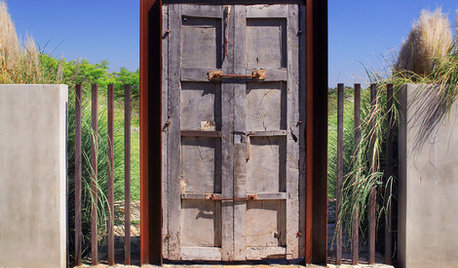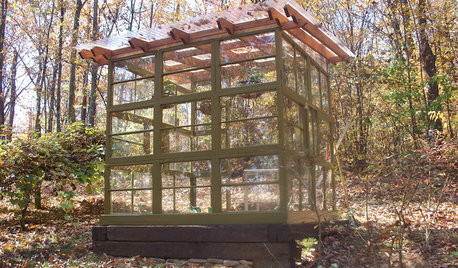need recommendation of liner for railroad ties
allen11
18 years ago
Related Stories

Woven Wood Shades Tie Rooms Together
Contrasting sharp modern edges or complementing a contemporary look, these window shades are a lovely finishing touch for any room
Full Story

MATERIALSMesquite: The Brawny Beauty for All Over the Home
Denser than other hardwoods and sporting beautiful coloration, mesquite makes a fine material for flooring, countertops, furniture and more
Full Story
COLOR20 Wide-Ranging Colors Touted for 2014
Behr takes its turn in the color-forecasting game with 4 paint collections from superbold to sophisticated
Full Story
BEFORE AND AFTERSKitchen Rehab: Don’t Nix It, Fix It
A small makeover makes a big impact in a traditional kitchen in Atlanta with great bones
Full Story
LANDSCAPE DESIGNA Luxury Greenhouse Lures Manhattanites to the Country
Industrial meets rustic in this stunning new structure for living and entertaining in rural Pennsylvania
Full Story
BATHROOM DESIGNShower Curtain or Shower Door?
Find out which option is the ideal partner for your shower-bath combo
Full Story
GARDENING AND LANDSCAPINGSee a Family Greenhouse Grown From Scraps
Can-do resourcefulness and less than $400 lead to a new 8- by 8-foot home for plants on a Tennessee family's property
Full Story
FARM YOUR YARDHow to Build a Raised Bed for Your Veggies and Plants
Whether you’re farming your parking strip or beautifying your backyard, a planting box you make yourself can come in mighty handy
Full Story
FIREPLACES9 Inventive Materials for Memorable Fireplace Mantels
Bypass plain brick in favor of these choice materials, for a fireplace mantel that's anything but ordinary
Full Story







squeeze
Kimmsr
Related Professionals
Finneytown Landscape Architects & Landscape Designers · Dudley Landscape Contractors · Marlborough Landscape Contractors · Melrose Park Landscape Contractors · Plainview Landscape Contractors · Point Pleasant Landscape Contractors · Roseville Landscape Contractors · Wailuku Landscape Contractors · Washington Landscape Contractors · Palos Hills Landscape Contractors · Haddonfield Decks, Patios & Outdoor Enclosures · Parlier Decks, Patios & Outdoor Enclosures · St. Louis Decks, Patios & Outdoor Enclosures · Sun Lakes Decks, Patios & Outdoor Enclosures · Villa Park Decks, Patios & Outdoor Enclosuresalthea_gw
squeeze
althea_gw
althea_gw
squeeze
althea_gw
squeeze
marylandmojo